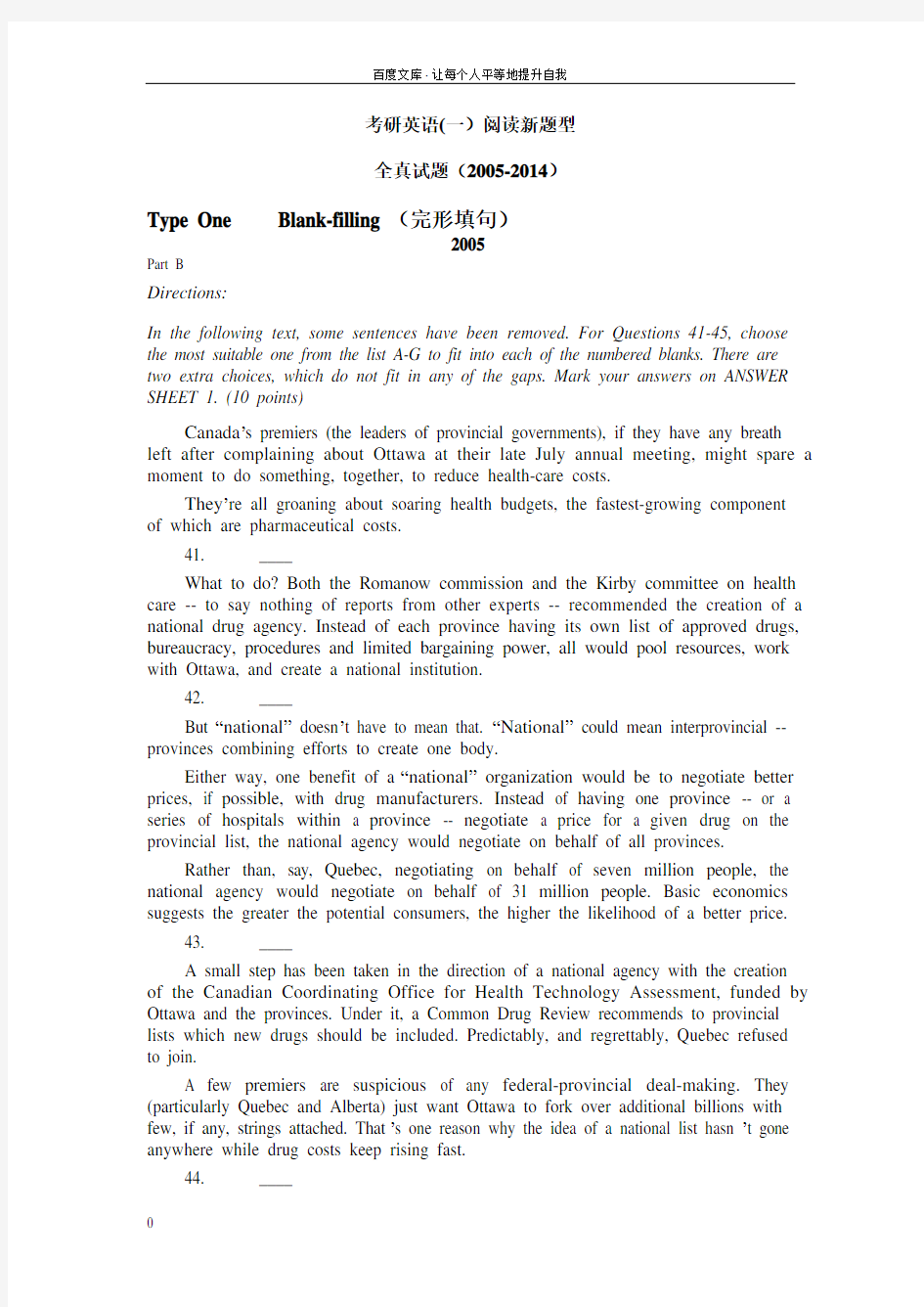考研英语一新题型历年真题(20052014)分类版

- 1、下载文档前请自行甄别文档内容的完整性,平台不提供额外的编辑、内容补充、找答案等附加服务。
- 2、"仅部分预览"的文档,不可在线预览部分如存在完整性等问题,可反馈申请退款(可完整预览的文档不适用该条件!)。
- 3、如文档侵犯您的权益,请联系客服反馈,我们会尽快为您处理(人工客服工作时间:9:00-18:30)。
考研英语(一)阅读新题型
全真试题(2005-2014)
Type One Blank-filling (完形填句)
2005
Part B
Directions:
In the following text, some sentences have been removed. For Questions 41-45, choose the most suitable one from the list A-G to fit into each of the numbered blanks. There are two extra choices, which do not fit in any of the gaps. Mark your answers on ANSWER SHEET 1. (10 points)
Canada’s premiers (the leaders of provincial governments), if they have any breath left after complaining about Ottawa at their late July annual meeting, might spare a moment to do something, together, to reduce health-care costs.
They’re all groaning about soaring health budgets, the fastest-growing component of which are pharmaceutical costs.
41. ____
What to do? Both the Romanow commission and the Kirby committee on health care -- to say nothing of reports from other experts -- recommended the creation of a national drug agency. Instead of each province having its own list of approved drugs, bureaucracy, procedures and limited bargaining power, all would pool resources, work with Ottawa, and create a national institution.
42. ____
But “national” doesn’t have to mean that. “National” could mean interprovincial -- provinces combining efforts to create one body.
Either way, one benefit of a “national” organization would be to negotiate better prices, if possible, with drug manufacturers. Instead of having one province -- or a series of hospitals within a province -- negotiate a price for a given drug on the provincial list, the national agency would negotiate on behalf of all provinces.
Rather than, say, Quebec, negotiating on behalf of seven million people, the national agency would negotiate on behalf of 31 million people. Basic economics suggests the greater the potential consumers, the higher the likelihood of a better price.
43. ____
A small step has been taken in the direction of a national agency with the creation of the Canadian Coordinating Office for Health Technology Assessment, funded by Ottawa and the provinces. Under it, a Common Drug Review recommends to provincial lists which new drugs should be included. Predictably, and regrettably, Quebec refused to join.
A few premiers are suspicious of any federal-provincial deal-making. They (particularly Quebec and Alberta) just want Ottawa to fork over additional billions with few, if any, strings attached. That’s one reason why the idea of a national list hasn’t gone anywhere while drug costs keep rising fast.
44. ____
Premiers love to quote Mr. Romanow’s report selectively, especially the parts about more federal money. Perhaps they should read what he had to say about drugs: “A national drug agency would provide governments more influence on pharmaceutical companies in order to constrain the ever-increasing cost of drugs.”
45. ________
So when the premiers gather in Niagara Falls to assemble their usual complaint list, they should also get cracking about something in their jurisdiction that would help their budgets and patients.
[A] Quebec’s resistance to a national agency is provincialist ideology. One of the
first advocates for a national list was a researcher at Laval University.
Quebec’s Drug Insurance Fund has seen its costs skyrocket with annual
increases from per cent to per cent!
[B] Or they could read Mr. Kirby’s report: “the substantial buying power of such
an agency would strengthen the public prescription-drug insurance plans to
negotiate the lowest possible purchase prices from drug companies.”
[C] What does “national”mean? Roy Romanow and Senator Michael Kirby
recommended a federal-provincial body much like the recently created
National Health Council.
[D] The problem is simple and stark: health-care costs have been, are, and will
continue to increase faster than government revenues.
[E] According to the Canadian Institute for Health Information, prescription drug
costs have risen since 1997 at twice the rate of overall health-care spending.
Part of the increase comes from drugs being used to replace other kinds of
treatments. Part of it arises from new drugs costing more than older kinds.
Part of it is higher prices.
[F] So, if the provinces want to run the health-care show, they should prove they
can run it, starting with an interprovincial health list that would end
duplication, save administrative costs, prevent one province from being
played off against another, and bargain for better drug prices.
[G] Of course the pharmaceutical companies will scream. They like divided buyers;
they can lobby better that way. They can use the threat of removing jobs from
one province to another. They can hope that, if one province includes a drug
on its list, the p ressure will cause others to include it on theirs. They wouldn’t
like a national agency, but self-interest would lead them to deal with it.
2006
Part B
Directions:
In the following text, some sentences have been removed. For Questions 41-45, choose the most suitable one from the list A-G to fit into each of the numbered blanks. There are two extra choices, which do not fit in any of the gaps. Mark your answers on ANSWER SHEET 1. (10 points)
On the north bank of the Ohio River sits Evansville, Ind., home of David Williams, 52, and of a riverboat casino where gambling games are played. During several years of
